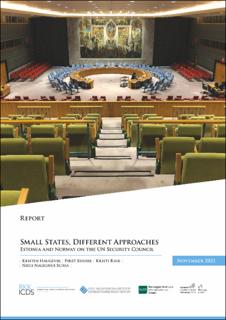| dc.description.abstract | In 2021, Estonia and Norway served as elected members of the United Nations Security Council (UNSC). Both being relatively small states, defending multilateral cooperation and rules-based in- ternational order were important common goals. In the last decade, great power tensions have returned to the Security Council, and multilateralism has again come under pressure. The opportu- nities of elected members to substantially influence the UNSC agenda are arguably limited by power struggles, complex subject matter and inefficient working methods. In spite of these limitations, both Estonia and Norway achieved some important outcomes as mem- bers of the Security Council. Their experiences confirm above all the value of diplomatic experience and reputation-building for elected members. To some extent, the two states have also been able to assume ownership of matters on the UNSC agenda. As in any diplomatic setting, knowing how to “play the game” is key to the ability of small states to punch above their weight. Specific methods through which elected members work to influence the UNSC agenda include: (i) coalition-building, (ii) actively using the presidency function, (iii) organising special events, and (iv) assuming the pen- holder role in a specific country or thematic issue. Common priority areas of Estonia and Norway in the UNSC include conflict resolution and peace- building, protection of human rights and especially women’s rights, and addressing new security challenges in the fields of cyber and climate. The most significant experience of cooperation during 2021 was the Estonian-Norwegian joint penholdership of the Afghanistan file which brought the two countries to the centre stage of global diplomacy and reinforced their international profile as small states that make an active and professional contribution to multilateral cooperation. Looking at Estonia’s and Norway’s performance in 2021, some interesting differences can be iden- tified. First, the two states assess the relative importance of the UN differently. In Norway’s for- eign policy, there is a strong tradition of prioritising the UN and seeing an active role in multilat- eral cooperation as an important contribution to national interests and security. By contrast, for Estonia, the UN has not been a foreign policy priority in the past, and its contribution to national security continues to be seen as secondary to membership in Western organisations, notably NATO and the EU. Furthermore, Norway has generally worked a bit more behind the scenes, relying on its long experi- ence and reputation as a constructive contributor to peace diplomacy. It has been active on issues such as the UNSC’s normative protection agenda and climate security, but also the Afghanistan, Syria and North Korea files. Meanwhile, Estonia has taken a rather bold approach as a newcomer visibly promoting its priorities, most notably the cybersecurity agenda. It has also focused on con- troversial issues of regional security, including the situations in Ukraine and Belarus, trying to use the UN to the advantage of national security through promoting its positions and strengthening coalitions with like-minded countries. Coordination between like-minded states is an integral part of the work of the Council. With Esto- nia and Norway both present, 2021 saw two Nordic-Baltic states concurrently represented in the Council for the first time. In the future, there may be scope for further strengthening Nordic-Baltic cooperation in the framework of the UN structures. | |
